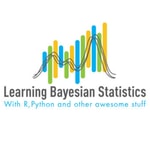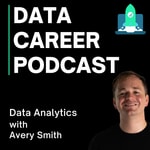Learning Bayesian Statistics – Détails, épisodes et analyse
Détails du podcast
Informations techniques et générales issues du flux RSS du podcast.

Learning Bayesian Statistics
Alexandre Andorra
Fréquence : 1 épisode/14j. Total Éps: 156

Classements récents
Dernières positions dans les classements Apple Podcasts et Spotify.
Apple Podcasts
🇬🇧 Grande Bretagne - technology
24/06/2025#70🇫🇷 France - technology
04/05/2025#82🇨🇦 Canada - technology
21/04/2025#82🇩🇪 Allemagne - technology
05/04/2025#79🇩🇪 Allemagne - technology
14/02/2025#89🇩🇪 Allemagne - technology
31/01/2025#93🇫🇷 France - technology
28/11/2024#79🇬🇧 Grande Bretagne - technology
11/11/2024#88🇬🇧 Grande Bretagne - technology
08/11/2024#64🇬🇧 Grande Bretagne - technology
06/11/2024#94
Spotify
Aucun classement récent disponible
Liens partagés entre épisodes et podcasts
Liens présents dans les descriptions d'épisodes et autres podcasts les utilisant également.
See all- https://podurama.com
1600 partages
- https://podurama.com/
1243 partages
- https://bababrinkman.com/
273 partages
- https://www.patreon.com/learnbayesstats
222 partages
- https://patreon.com/betanalpha
2 partages
- https://www.patreon.com/twiecki
2 partages
- https://twitter.com/mkennedy
7 partages
- https://twitter.com/KordingLab
7 partages
- https://twitter.com/seanjtaylor
6 partages
Qualité et score du flux RSS
Évaluation technique de la qualité et de la structure du flux RSS.
See allScore global : 59%
Historique des publications
Répartition mensuelle des publications d'épisodes au fil des années.
#115 Using Time Series to Estimate Uncertainty, with Nate Haines
Saison 1 · Épisode 115
mardi 17 septembre 2024 • Durée 01:39:51
Proudly sponsored by PyMC Labs, the Bayesian Consultancy. Book a call, or get in touch!
Our theme music is « Good Bayesian », by Baba Brinkman (feat MC Lars and Mega Ran). Check out his awesome work!
Visit our Patreon page to unlock exclusive Bayesian swag ;)
Takeaways:
- State space models and traditional time series models are well-suited to forecast loss ratios in the insurance industry, although actuaries have been slow to adopt modern statistical methods.
- Working with limited data is a challenge, but informed priors and hierarchical models can help improve the modeling process.
- Bayesian model stacking allows for blending together different model predictions and taking the best of both (or all if more than 2 models) worlds.
- Model comparison is done using out-of-sample performance metrics, such as the expected log point-wise predictive density (ELPD). Brute leave-future-out cross-validation is often used due to the time-series nature of the data.
- Stacking or averaging models are trained on out-of-sample performance metrics to determine the weights for blending the predictions. Model stacking can be a powerful approach for combining predictions from candidate models. Hierarchical stacking in particular is useful when weights are assumed to vary according to covariates.
- BayesBlend is a Python package developed by Ledger Investing that simplifies the implementation of stacking models, including pseudo Bayesian model averaging, stacking, and hierarchical stacking.
- Evaluating the performance of patient time series models requires considering multiple metrics, including log likelihood-based metrics like ELPD, as well as more absolute metrics like RMSE and mean absolute error.
- Using robust variants of metrics like ELPD can help address issues with extreme outliers. For example, t-distribution estimators of ELPD as opposed to sample sum/mean estimators.
- It is important to evaluate model performance from different perspectives and consider the trade-offs between different metrics. Evaluating models based solely on traditional metrics can limit understanding and trust in the model. Consider additional factors such as interpretability, maintainability, and productionization.
- Simulation-based calibration (SBC) is a valuable tool for assessing parameter estimation and model correctness. It allows for the interpretation of model parameters and the identification of coding errors.
- In industries like insurance, where regulations may restrict model choices, classical statistical approaches still play a significant role. However, there is potential for Bayesian methods and generative AI in certain areas.
#114 From the Field to the Lab – A Journey in Baseball Science, with Jacob Buffa
Saison 1 · Épisode 114
jeudi 5 septembre 2024 • Durée 01:01:32
Proudly sponsored by PyMC Labs, the Bayesian Consultancy. Book a call, or get in touch!
Our theme music is « Good Bayesian », by Baba Brinkman (feat MC Lars and Mega Ran). Check out his awesome work!
Visit our Patreon page to unlock exclusive Bayesian swag ;)
Takeaways:
- Education and visual communication are key in helping athletes understand the impact of nutrition on performance.
- Bayesian statistics are used to analyze player performance and injury risk.
- Integrating diverse data sources is a challenge but can provide valuable insights.
- Understanding the specific needs and characteristics of athletes is crucial in conditioning and injury prevention. The application of Bayesian statistics in baseball science requires experts in Bayesian methods.
- Traditional statistical methods taught in sports science programs are limited.
- Communicating complex statistical concepts, such as Bayesian analysis, to coaches and players is crucial.
- Conveying uncertainties and limitations of the models is essential for effective utilization.
- Emerging trends in baseball science include the use of biomechanical information and computer vision algorithms.
- Improving player performance and injury prevention are key goals for the future of baseball science.
Chapters:
00:00 The Role of Nutrition and Conditioning
05:46 Analyzing Player Performance and Managing Injury Risks
12:13 Educating Athletes on Dietary Choices
18:02 Emerging Trends in Baseball Science
29:49 Hierarchical Models and Player Analysis
36:03 Challenges of Working with Limited Data
39:49 Effective Communication of Statistical Concepts
47:59 Future Trends: Biomechanical Data Analysis and Computer Vision Algorithms
Thank you to my Patrons for making this episode possible!
Yusuke Saito, Avi Bryant, Ero Carrera, Giuliano Cruz, Tim Gasser, James Wade, Tradd Salvo, William Benton, James Ahloy, Robin Taylor,, Chad Scherrer, Zwelithini Tunyiswa, Bertrand Wilden, James Thompson, Stephen Oates, Gian Luca Di Tanna, Jack Wells, Matthew Maldonado, Ian Costley, Ally Salim, Larry Gill, Ian Moran, Paul Oreto, Colin Caprani, Colin Carroll, Nathaniel Burbank, Michael Osthege, Rémi Louf, Clive Edelsten, Henri Wallen, Hugo Botha, Vinh Nguyen, Marcin Elantkowski, Adam C. Smith, Will Kurt, Andrew Moskowitz, Hector Munoz, Marco Gorelli, Simon Kessell, Bradley Rode, Patrick Kelley, Rick Anderson, Casper de Bruin, Philippe Labonde,...
#105 The Power of Bayesian Statistics in Glaciology, with Andy Aschwanden & Doug Brinkerhoff
Saison 1 · Épisode 105
jeudi 2 mai 2024 • Durée 01:15:25
Proudly sponsored by PyMC Labs, the Bayesian Consultancy. Book a call, or get in touch!
In this episode, Andy Aschwanden and Doug Brinkerhoff tell us about their work in glaciology and the application of Bayesian statistics in studying glaciers. They discuss the use of computer models and data analysis in understanding glacier behavior and predicting sea level rise, and a lot of other fascinating topics.
Andy grew up in the Swiss Alps, and studied Earth Sciences, with a focus on atmospheric and climate science and glaciology. After his PhD, Andy moved to Fairbanks, Alaska, and became involved with the Parallel Ice Sheet Model, the first open-source and openly-developed ice sheet model.
His first PhD student was no other than… Doug Brinkerhoff! Doug did an MS in computer science at the University of Montana, focusing on numerical methods for ice sheet modeling, and then moved to Fairbanks to complete his PhD. While in Fairbanks, he became an ardent Bayesian after “seeing that uncertainty needs to be embraced rather than ignored”. Doug has since moved back to Montana, becoming faculty in the University of Montana’s computer science department.
Our theme music is « Good Bayesian », by Baba Brinkman (feat MC Lars and Mega Ran). Check out his awesome work at https://bababrinkman.com/ !
Thank you to my Patrons for making this episode possible!
Yusuke Saito, Avi Bryant, Ero Carrera, Giuliano Cruz, Tim Gasser, James Wade, Tradd Salvo, William Benton, James Ahloy, Robin Taylor,, Chad Scherrer, Zwelithini Tunyiswa, Bertrand Wilden, James Thompson, Stephen Oates, Gian Luca Di Tanna, Jack Wells, Matthew Maldonado, Ian Costley, Ally Salim, Larry Gill, Ian Moran, Paul Oreto, Colin Caprani, Colin Carroll, Nathaniel Burbank, Michael Osthege, Rémi Louf, Clive Edelsten, Henri Wallen, Hugo Botha, Vinh Nguyen, Marcin Elantkowski, Adam C. Smith, Will Kurt, Andrew Moskowitz, Hector Munoz, Marco Gorelli, Simon Kessell, Bradley Rode, Patrick Kelley, Rick Anderson, Casper de Bruin, Philippe Labonde, Michael Hankin, Cameron Smith, Tomáš Frýda, Ryan Wesslen, Andreas Netti, Riley King, Yoshiyuki Hamajima, Sven De Maeyer, Michael DeCrescenzo, Fergal M, Mason Yahr, Naoya Kanai, Steven Rowland, Aubrey Clayton, Jeannine Sue, Omri Har Shemesh, Scott Anthony Robson, Robert Yolken, Or Duek, Pavel Dusek, Paul Cox, Andreas Kröpelin, Raphaël R, Nicolas Rode, Gabriel Stechschulte, Arkady, Kurt TeKolste, Gergely Juhasz, Marcus Nölke, Maggi Mackintosh, Grant Pezzolesi, Avram Aelony, Joshua Meehl, Javier Sabio, Kristian Higgins, Alex Jones, Gregorio Aguilar, Matt Rosinski, Bart Trudeau, Luis Fonseca, Dante Gates, Matt Niccolls, Maksim Kuznecov, Michael Thomas, Luke Gorrie, Cory Kiser, Julio, Edvin Saveljev, Frederick Ayala, Jeffrey Powell, Gal Kampel, Adan Romero and Will Geary.
Visit https://www.patreon.com/learnbayesstats to unlock exclusive Bayesian swag ;)
#27 Modeling the US Presidential Elections, with Andrew Gelman & Merlin Heidemanns
Saison 1 · Épisode 27
dimanche 1 novembre 2020 • Durée 01:00:53
In a few days, a consequential election will take place, as citizens of the United States will go to the polls and elect their president — in fact they already started voting. You probably know a few forecasting models that try to predict what will happen on Election Day — who will get elected, by how much and with which coalition of States?
But how do these statistical models work? How do you account for the different sources of uncertainty, be it polling errors, unexpected turnout or media events? How do you model covariation between States? How do you even communicate the model’s results and afterwards assess its performance? To talk about all this, I had the pleasure to talk to Andrew Gelman and Merlin Heidemanns.
Andrew was already on episode 20, to talk about his recent book with Jennifer Hill and Aki Vehtari, “Regression and Other Stories”. He’s a professor of statistics and political science at Columbia University and works on a lot of topics, including: why campaign polls are so variable while elections are so predictable, the statistical challenges of estimating small effects, and methods for surveys and experimental design.
Merlin is a PhD student in Political Science at Columbia University, and he specializes in political methodology. Prior to his PhD, he did a Bachelor's in Political Science at the Freie Universität Berlin.
I hope you’ll enjoy this episode where we dove into the Bayesian model they helped develop for The Economist, and talked more generally about how to forecast elections with statistical methods, and even about the incentives the forecasting industry has as a whole.
Thank you to my Patrons for making this episode possible! Visit https://www.patreon.com/learnbayesstats to unlock exclusive Bayesian swag ;)
Our theme music is « Good Bayesian », by Baba Brinkman (feat MC Lars and Mega Ran). Check out his awesome work at https://bababrinkman.com/ !
Links from the show:
- Andrew's website: http://www.stat.columbia.edu/~gelman/
- Andrew's blog: https://statmodeling.stat.columbia.edu/
- Andrew on Twitter: https://twitter.com/statmodeling
- Merlin's website: https://merlinheidemanns.github.io/website/
- Merlin on Twitter: https://twitter.com/MHeidemanns
- The Economist POTUS forecast: https://projects.economist.com/us-2020-forecast/president
- How The Economist presidential forecast works: https://projects.economist.com/us-2020-forecast/president/how-this-works
- GitHub repo of the Economist model: https://github.com/TheEconomist/us-potus-model
- Information, incentives, and goals in election forecasts (Gelman, Hullman & Wlezien): http://www.stat.columbia.edu/~gelman/research/unpublished/forecast_incentives3.pdf
- How to think about extremely...
#26 What you’ll learn & who you’ll meet at the PyMC Conference, with Ravin Kumar & Quan Nguyen
Saison 1 · Épisode 26
samedi 24 octobre 2020 • Durée 46:25
I don’t know about you, but I’m starting to really miss traveling and just talking to people without having to think about masks, social distance and activating the covid tracking app on my phone. In the coming days, there is one event that, granted, won’t make all of that disappear, but will remind me how enriching it is to meet new people — this event is PyMCon, the first-ever conference about the PyMC ecosystem! To talk about the conference format, goals and program, I had the pleasure to host Ravin Kumar and Quan Nguyen on the show.
Quan is a PhD student in computer science at Washington University in St Louis, USA, researching Bayesian machine learning and one of the PyMCon program committee chairs. He is also the author of several programming books on Python and scientific computing.
Ravin is a core contributor to Arviz and PyMC, and is leading the PyMCon conference. He holds a Bachelors in Mechanical Engineering and a Masters in Manufacturing Engineering. As a Principal Data Scientist he has used Bayesian Statistics to characterize and aid decision making at organizations like SpaceX and Sweetgreen. Ravin is also currently co-authoring a book with Ari Hartikainen, Osvaldo Martin, and Junpeng Lao on Bayesian Statistics due for release in February.
We talked about why they became involved in the conference, parsed through the numerous, amazing talks that are planned, and detailed who the keynote speakers will be… So, If you’re interested the link to register is in the show notes, and there are even two ways to get a free ticket: either by applying to a diversity scholarship, or by being a community partner, which is anyone or any organization working towards diversity and inclusion in tech — all links are in the show notes.
Our theme music is « Good Bayesian », by Baba Brinkman (feat MC Lars and Mega Ran). Check out his awesome work at https://bababrinkman.com/ !
Links from the show:
- PyMCon speakers: https://pymc-devs.github.io/pymcon/speakers
- Register to PyMCon: https://www.eventbrite.com/e/pymcon-2020-tickets-121404065829
- PyMCon Diversity Scholarship: https://bit.ly/2J3Vb9d
- PyMCon Community Partner Form: https://bit.ly/35yq90L
- PyMC3 -- Probabilistic Programming in Python: https://docs.pymc.io
- Donate to PyMC3: https://numfocus.org/donate-to-pymc3
- PyMC3 for enterprise: https://bit.ly/3jo9jq9
- Ravin on Twitter: https://twitter.com/canyon289
- Quan on the web: https://krisnguyen135.github.io/
- Quan's author page: https://amzn.to/37JsB7r
- Alex talks about polls on the "Local Maximum" podcast: https://bit.ly/3e1Ro7O
- Support "Learning Bayesian Statistics" on Patreon: https://www.patreon.com/learnbayesstats
Thank you to my Patrons for making...
#25 Bayesian Stats in Football Analytics, with Kevin Minkus
Saison 1 · Épisode 25
vendredi 9 octobre 2020 • Durée 55:59
Have you watched the series « The English Game », on Netflix? Well, I think you should — it’s a fascinating dive into how football went from an aristocratic to a popular sport in the late 19th century England. Today it is so popular that it became a valuable business to do statistics on the game and its players!
To talk about that, I invited Kevin Minkus on the show — he’s a data scientist and soccer fan living in Philadelphia. Kevin’s currently working at Monetate on ecommerce problems, and prior to Monetate he worked on property and casualty insurance pricing.
He spends a lot of his spare time working on problems in football analytics and is a contributor at American Soccer Analysis, a website and podcast dedicated to… football made or played in the US (or “soccer”, as they say over there). Kevin is responsible for some of their data management and devops, and he recently wrote a guide to football analytics for the Major League Soccer’s website, entitled « Soccer Analytics 101 ».
To be honest, I had a great time talking for one hour about two of my passions — football and stats! Soooo, maybe 2020 isn’t that bad after all… Ow, and beyond football, Kevin is also into the digital humanities, web development, 3D animation, machine learning, and… the bassoon!
Our theme music is « Good Bayesian », by Baba Brinkman (feat MC Lars and Mega Ran). Check out his awesome work at https://bababrinkman.com/ !
Links from the show:
- Kevin on Twitter: https://twitter.com/kevinminkus
- Kevin on GitHub: https://github.com/kcm30
- Soccer Analytics 101: https://www.mlssoccer.com/soccer-analytics-guide/2020/soccer-analytics-101
- American Soccer Analysis: https://www.americansocceranalysis.com/
Thank you to my Patrons for making this episode possible!
Yusuke Saito, Avi Bryant, Ero Carrera, Brian Huey, Giuliano Cruz, Tim Gasser, James Wade, Tradd Salvo, Adam Bartonicek, William Benton, Alan O'Donnell, Mark Ormsby, Demetri Pananos, James Ahloy, Jon Berezowski, Robin Taylor, Thomas Wiecki, Chad Scherrer, Vincent Arel-Bundock, Nathaniel Neitzke, Zwelithini Tunyiswa, Elea McDonnell Feit, Bertrand Wilden, James Thompson, Stephen Oates, Gian Luca Di Tanna, Jack Wells, Matthew Maldonado, Ian Costley, Ally Salim, Larry Gill, Joshua Duncan, Ian Moran and Paul Oreto.
#24 Bayesian Computational Biology in Julia, with Seth Axen
Saison 1 · Épisode 24
jeudi 24 septembre 2020 • Durée 56:30
Do you know what proteins are, what they do and why they are useful? Well, be prepared to be amazed! In this episode, Seth Axen will tell us about the fascinating world of protein structures and computational biology, and how his work of Bayesian modeler fits into that!
Passionate about mathematics and statistics, Seth is finishing a PhD in bioinformatics at the Sali Lab of the University of California, San Francisco (UCSF). His research interests span the broad field of computational biology: using computer science, mathematics, and statistics to understand biological systems. His current research focuses on inferring protein structural ensembles.
Open source development is also very dear to his heart, and indeed he contributes to many open source packages, especially in the Julia ecosystem. In particular, he develops and maintains ArviZ.jl, the Julia port of ArviZ, a platform-agnostic python package to visualize and diagnose your Bayesian models. Seth will tell us how he became involved in ArviZ.jl, what its strengths and weaknesses are, and how it fits into the Julia probabilistic programming landscape.
Ow, and as a bonus, you’ll discover why Seth is such a fan of automatic differentiation, aka « autodiff » — I actually wanted to edit this part out but Seth strongly insisted I kept it. Just kidding of course — or, am I… ?
Our theme music is « Good Bayesian », by Baba Brinkman (feat MC Lars and Mega Ran). Check out his awesome work at https://bababrinkman.com/ !
Links from the show:
- Seth website: http://sethaxen.com/
- Seth on Twitter: https://twitter.com/sethaxen
- Seth on GitHub: https://github.com/sethaxen
- ArviZ.jl -- Exploratory analysis of Bayesian models in Julia: https://arviz-devs.github.io/ArviZ.jl/dev/
- PyCon2020 -- Colin Carroll -- Getting started with automatic differentiation: https://www.youtube.com/watch?v=NG21KWZSiok
Thank you to my Patrons for making this episode possible!
Yusuke Saito, Avi Bryant, Ero Carrera, Brian Huey, Giuliano Cruz, Tim Gasser, James Wade, Tradd Salvo, Adam Bartonicek, William Benton, Alan O'Donnell, Mark Ormsby, Demetri Pananos, James Ahloy, Jon Berezowski, Robin Taylor, Thomas Wiecki, Chad Scherrer, Vincent Arel-Bundock, Nathaniel Neitzke, Zwelithini Tunyiswa, Elea McDonnell Feit, Bertrand Wilden, James Thompson, Stephen Oates, Gian Luca Di Tanna, Jack Wells, Matthew Maldonado, Ian Costley, Ally Salim, Larry Gill, Joshua Duncan, Ian Moran and Paul Oreto.
#23 Bayesian Stats in Business and Marketing Analytics, with Elea McDonnel Feit
Saison 1 · Épisode 23
jeudi 10 septembre 2020 • Durée 59:06
If you’ve studied at a business school, you probably didn’t attend any Bayesian stats course there. Well this isn’t like that in every business schools! Elea McDonnel Feit does integrate Bayesian methods into her teaching at the business school of Drexel University, in Philadelphia, US.
Elea is an Assistant Professor of Marketing at Drexel, and in this episode she’ll tell us which methods are the most useful in marketing analytics, and why.
Indeed, Elea develops data analysis methods to inform marketing decisions, such as designing new products and planning advertising campaigns. Often faced with missing, unmatched or aggregated data, she uses MCMC sampling, hierarchical models and decision theory to decipher all this.
After an MS in Industrial Engineering at Lehigh University and a PhD in Marketing at the University of Michigan, Elea worked on product design at General Motors and was most recently the Executive Director of the Wharton Customer Analytics Initiative.
Thanks to all these experiences, Elea loves teaching marketing analytics and Bayesian and causal inference at all levels. She even wrote the book R for Marketing Research and Analytics with Chris Chapman, at Springer Press.
In summary, I think you’ll be pretty surprised by how Bayesian the world of marketing is…
Our theme music is « Good Bayesian », by Baba Brinkman (feat MC Lars and Mega Ran). Check out his awesome work at https://bababrinkman.com/ !
Links from the show:
- Elea's website: http://eleafeit.com/
- R for Marketing Research and Analytics: http://r-marketing.r-forge.r-project.org/
- Elea's Tutorials & Online Courses: http://eleafeit.com/teaching/
- Elea on Twitter: https://twitter.com/eleafeit
- Elea on GitHub: https://github.com/eleafeit
- Tutorial on Conjoint Analysis in R: https://github.com/ksvanhorn/ART-Forum-2017-Stan-Tutorial
- Test & Roll app: https://testandroll.shinyapps.io/testandroll/
- Test & Roll Paper -- Profit-Maximizing A/B Tests: https://papers.ssrn.com/sol3/papers.cfm?abstract_id=3274875
- Principal Stratification for Advertising Experiments: https://papers.ssrn.com/sol3/papers.cfm?abstract_id=3140631
- CausalImpact R package: https://google.github.io/CausalImpact/CausalImpact.html
- Chapter on Data Fusion in marketing: https://link.springer.com/referenceworkentry/10.1007/978-3-319-05542-8_9-1
- Statistical Analysis with Missing Data (Little & Rubin): https://onlinelibrary.wiley.com/doi/book/10.1002/9781119013563
- R-Ladies Philly YouTube channel:
#22 Eliciting Priors and Doing Bayesian Inference at Scale, with Avi Bryant
Saison 1 · Épisode 22
mercredi 26 août 2020 • Durée 01:06:56
If, like me, you’ve been stuck in a 40 square-meter apartment for two months, you’re going to be pretty jealous of Avi Bryant. Indeed, Avi lives on Galiano Island, Canada, not very far from Vancouver, surrounded by forest, overlooking the Salish Sea.
In this natural and beautiful — although slightly deer-infested — spot, Avi runs The Gradient Retreat Center, a place where writers, makers, and code writers can take a week away from their regular lives and focus on creative work. But it’s not only to envy him that I invited Avi on the show — it’s to talk about Bayesian inference in Scala, prior elicitation, how to deploy Bayesian methods at scale, and how to enable Bayesian inference for engineers.
While working at Stripe, Avi wrote Rainier, a Bayesian inference framework for Scala. Inference is based on variants of the Hamiltonian Monte Carlo sampler, and the implementation is similar to, and targets the same types of models as both Stan and PyMC3. As Avi says, depending on your background, you might think of Rainier as aspiring to be either "Stan, but on the JVM", or "TensorFlow, but for small data".
In this episode, Avi will tell us how Rainier came into life, how it fits into the probabilistic programming landscape, and what its main strengths and weaknesses are.
Our theme music is « Good Bayesian », by Baba Brinkman (feat MC Lars and Mega Ran). Check out his awesome work at https://bababrinkman.com/ !
Links from the show:
- Avi on Twitter: https://twitter.com/avibryant
- Avi on GitHub: https://github.com/avibryant
- Rainier -- Bayesian Inference in Scala: https://rainier.fit/
- The Gradient Retreat: https://gradientretreat.com/
- Facebook's Prophet: https://facebook.github.io/prophet/
- BAyesian Model-Building Interface (Bambi) in Python: https://bambinos.github.io/bambi/
- BRMS -- Bayesian regression models using Stan: https://paul-buerkner.github.io/brms/
- Using Bayesian Decision Making to Optimize Supply Chains -- Thomas Wiecki & Ravin Kumar: https://twiecki.io/blog/2019/01/14/supply_chain/
Thank you to my Patrons for making this episode possible!
Yusuke Saito, Avi Bryant, Ero Carrera, Brian Huey, Giuliano Cruz, Tim Gasser, James Wade, Tradd Salvo, Adam Bartonicek, William Benton, Alan O'Donnell, Mark Ormsby, Demetri Pananos, James Ahloy, Jon Berezowski, Robin Taylor, Thomas Wiecki, Chad Scherrer, Vincent Arel-Bundock, Nathaniel Neitzke, Zwelithini Tunyiswa, Elea McDonnell Feit, Bertrand Wilden, James Thompson, Stephen Oates, Gian Luca Di Tanna, Jack Wells, Matthew Maldonado, Ian Costley, Ally Salim, Larry Gill, Joshua Duncan, Ian Moran and Paul Oreto.
#21 Gaussian Processes, Bayesian Neural Nets & SIR Models, with Elizaveta Semenova
Saison 1 · Épisode 21
jeudi 13 août 2020 • Durée 01:02:12
I bet you heard a lot about epidemiological compartmental models such as SIR in the last few months? But what are they exactly? And why are they so useful for epidemiological modeling?
Elizaveta Semenova will tell you why in this episode, by walking us through the case study she recently wrote with the Stan team. She’ll also tell us how she used Gaussian Processes on spatio-temporal data, to study the spread of Malaria, or to fit dose-response curves in pharmaceutical tests.
And finally, she’ll tell us how she used Bayesian neural networks for drug toxicity prediction in her latest paper, and how Bayesian neural nets behave compared to classical neural nets. Ow, and you’ll also learn an interesting link between BNNs and Gaussian Processes…
I know: Liza works on _a lot_ of projects! But who is she? Well, she’s a postdoctorate in Bayesian Machine Learning at the pharmaceutical company AstraZeneca, in Cambridge, UK.
Elizaveta did her masters in theoretical mathematics in Moscow, Russia, and then worked in financial services as an actuary in various European countries. She then did a PhD in epidemiology at the University of Basel, Switzerland. This is where she got interested in health applications – be it epidemiology, global health or more small-scale biological questions. But she’ll tell you all that in the episode ;)
Our theme music is « Good Bayesian », by Baba Brinkman (feat MC Lars and Mega Ran). Check out his awesome work at https://bababrinkman.com/ !
Links from the show:
- Liza on Twitter: https://twitter.com/liza_p_semenova
- Liza on GitHub: https://github.com/elizavetasemenova
- Liza's blog: https://elizavetasemenova.github.io/blog/
- A Bayesian neural network for toxicity prediction: https://www.biorxiv.org/content/10.1101/2020.04.28.065532v2
- Bayesian Neural Networks for toxicity prediction -- Video presentation: https://www.youtube.com/watch?v=BCQ2oVlu_tY&t=751s
- Bayesian workflow for disease transmission modeling in Stan: https://mc-stan.org/users/documentation/case-studies/boarding_school_case_study.html
- Andrew Gelman's comments on the SIR case-study: https://statmodeling.stat.columbia.edu/2020/06/02/this-ones-important-bayesian-workflow-for-disease-transmission-modeling-in-stan/
- Determining organ weight toxicity with Bayesian causal models: https://www.biorxiv.org/content/10.1101/754853v1
- Material for Applied Machine Learning Days ("Embracing uncertainty"): https://github.com/elizavetasemenova/EmbracingUncertainty
- Predicting Drug-Induced Liver Injury with Bayesian Machine Learning: https://pubs.acs.org/doi/abs/10.1021/acs.chemrestox.9b00264
- Ordered Logistic Regression in Stan, PyMC3 and Turing: https://medium.com/@liza_p_semenova/ordered-logistic-regression-and-probabilistic-programming-502d8235ad3f
- PyMCon website: https://pymc-devs.github.io/pymcon/
- PyMCon Call For Proposal: https://pymc-devs.github.io/pymcon/cfp
- PyMCon...









